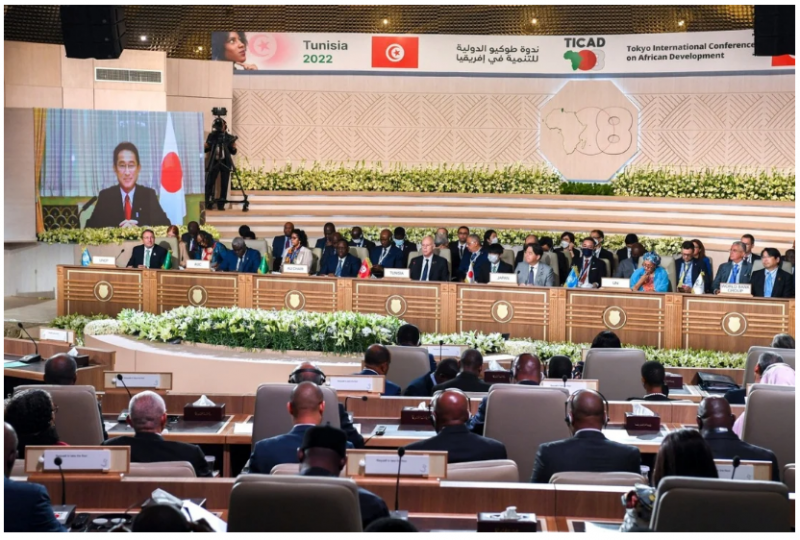
Japan: In an effort to counter China's growing influence, Japan plans to pour $30 billion in aid and investment into Africa over the next three years from both its public and private sectors.
Prime Minister Kishida Fumio stressed that Japan will "develop together with Africa" in his remarks on Saturday at the Eighth Tokyo International Conference on African Development (TICAD).
The US$20 billion that Japan promised African countries in 2019 has been increased, and according to Kishida, "we have essentially achieved it over the past three years."
The pledge is seen as Tokyo's attempt to secede from China, which has come under fire from the US and other Western nations for hoarding loans to African countries.
In an effort to rekindle interest in the continent, find raw materials for its industries, and expand markets for its goods, Japan established TICAD in 1993. A decade or so later, China began hosting a rival conference called the Forum on China-Africa Cooperation, as Japan was turning inward and trying to revive its faltering economy.
Over time, Japan's engagement with Africa has shifted from aid to private sector-driven investment.
According to the Japan Foreign Trade Organization, Japan's overall trade with the continent is a small part of Africa's trade with China. Africa exported Japan $8.6 billion in 2020, compared to US$7.9 billion in imports from Japan.
China's total two-way trade with the continent, in contrast, totaled $254 billion last year.
Last year, President Xi Jinping promised to increase imports from the continent to US$300 billion over the course of three years and US$40 billion in loans and investments for Africa.
Japan is hardly noticeable in Africa, except for the TICAD meetings that take place every three years. Sefudin Edem, professor of international relations at Doshisha University in Kyoto, Japan, claimed that "Africa is also invisible in Japan."
"China is also ahead in spreading its ideas and values to Africa," Adam continued. The trend started earlier, but the global pandemic has widened the gap between Africa and Japan.
He claimed that over the past three decades, both Japan's relative power and its diplomatic and economic interest in Africa have declined. Edem said Japan's engagement with Africa has been "slightly inspired by China's re-emergence as a global hegemony and will continue to do so."
In a speech delivered via video link at TICAD-8 in Tunis, which was attended by a large number of heads of state and diplomats, Kishida announced that Tokyo will collaborate with the African Development Bank to extend a loan of about $5 billion. will serve as a durable support for Africa's development.
This includes a unique, recently established loan of up to $1 billion, which the prime minister has said "to advance reforms resulting in sound debt management and helping a resilient and sustainable Africa."
Kishida also disclosed an additional US$4 billion to support Japan's green development initiative. Additionally, he pledged more than $1 billion to the Global Fund to help stop the spread of COVID-19 and other infectious diseases in Africa.
At a time when there is a global grain shortage and the international order is at risk due to Russia's invasion of Ukraine, Kishida said Tokyo will do its best to ensure grain shipments to Africa.
Japan has joined other members of the Group of Seven countries in imposing sanctions against Russia. However, there is disagreement on the continent regarding Moscow's conflict in Ukraine, with some countries taking a neutral stance and others opposing sanctions that Russia has cited as the cause of the continent's food shortages.
According to Adam of Doshisha University, Japan's strategy for African development is unique because it emphasizes transparency and the excellence of its projects.
But from Japan's perspective, China's growing influence in Africa over the past 20 years has made them even more important in an effort to counter China's insurmountable competitive advantage, says Adem, author of a book on Lessons from Japan and China for Africa. According to, be published soon.
Unlike former leaders, he claimed that Kishida "has been more cautious in his diplomacy so far." Perhaps the days of the bold initiative led by the late Shinzo Abe, Friend of Africa, are over, he said.
According to Jonathan Berkshire Miller, a senior fellow at the Japan Institute, the benefit of Tokyo will be to provide high-quality infrastructure in line with G20 priorities, and also enable African SMEs [small and medium-sized enterprises] through public-private partnerships. Will happen. of International Affairs.
Japan has been making progress on this for decades, according to him, through his TICAD process and the ongoing development of its aid to the continent.
According to Miller, Japan has a dynamic approach towards Africa. "Africa is changing, and Japan is also realising that its relations with the continent also need to balance the growing economic and geopolitical dimensions," the author of the statement notes. Japan should eventually focus more on strengthening existing alliances with India and other countries in the region.
For African states to take control of partnerships and infrastructure cooperation, he said, TICAD this year is even more crucial. "The focus should be on partnership-based ventures that don't burden African states with unmanageable debt," Miller said. "As the inflationary pressures and economic headwinds continue in recent months."
Can Japan become more secure by tripling its military spending?
Honda to Cut Output by up to 40% in this Country
Sri Lanka Prez directed to ensure Gotabaya Rajapaksa's return